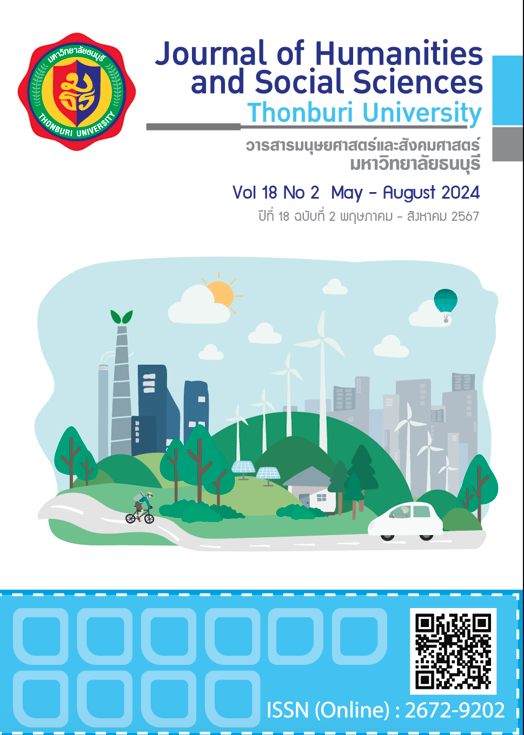Community-based Product Development and Income Distribution: A Case Study of Tonsai Snack Boxes in Wat Sai Community, Thailand
Keywords:
Community-based product development, Income distribution, Sustainable income sourcesAbstract
This study explores the use of community-based product development and income distribution as a means of generating sustainable income within the Wat Sai community. Specifically, the study focuses on the development and distribution of Tonsai snack boxes by a community club. Using interviews, questionnaires, and focus group discussions, the study investigates the process and outcomes of income generation in the community. The results suggest that the community-based approach promoted income-generating skills and knowledge, resulting in the creation of a new product line with a distinctive brand name and packaging. Customers praised the Tonsai snack boxes, but there are still some areas for improvement, such as packaging and distribution methods. The study also found that the club established a fair revenue distribution principle, although the revenue distribution pattern for snack boxes was unclear due to limited sales. Focus group discussions were conducted to identify appropriate forms of income distribution and propose guidelines for desirable forms of club membership for community clubs. Overall, the study highlights the importance of involving all stakeholders in the product development and income distribution processes to achieve sustainable and self-reliant income sources and provides valuable insights into effective community-based product development and income distribution strategies.
References
Bilan, Y., Mishchuk, H., Samoliuk, N., & Yurchyk, H. (2020). Impact of income distribution on social and economic well-being of the state. Sustainability, 12(1), 429.
Brannen, J., & Wilson, G. (Eds.). (2023). Give and take in families: Studies in resource distribution. Taylor & Francis.
Chan, N. W., Roy, R., Lai, C. H., & Tan, M. L. (2018). Social capital as a vital resource in flood disaster recovery in Malaysia. International Journal of Water Resources Development.
Duxbury, N., Bakas, F. E., Vinagre de Castro, T., & Silva, S. (2020). Creative tourism development models towards sustainable and regenerative tourism. Sustainability, 13(1), 2.
Epstein, J. L., Sanders, M. G., Sheldon, S. B., Simon, B. S., Salinas, K. C., Jansorn, N. R., ... & Williams, K. J. (2018). School, family, and community partnerships: Your handbook for action. Corwin Press.
Harris-Smith, K., & Palmer, C. (2022). Donor funded community-based tourism development projects: The experience of rural mountain communities in Tajikistan’s zerafshan valley. Tourism Planning & Development, 19(2), 119-142.
Hartanto, D., Dalle, J., Akrim, A., & Anisah, H. U. (2021). Perceived effectiveness of e-governance as an underlying mechanism between good governance and public trust: a case of Indonesia. Digital Policy, Regulation And Governance, 23(6), 598-616.
He, J., Martin, A., Lang, R., & Gross-Camp, N. (2021). Explaining success on community forestry through a lens of environmental justice: Local justice norms and practices in China. World Development, 142, 105450.
Khan, I., Khan, I., Sayal, A. U., & Khan, M. Z. (2022). Does financial inclusion induce poverty, income inequality, and financial stability: empirical evidence from the 54 African countries?. Journal of Economic Studies, 49(2), 303-314.
Kılıçkap, H. D. (2019). Designing Tourism Services for Sustainable Development in Finnish Lapland Using Service Design Tools.
Lee, J. W., & Lee, H. (2018). Human capital and income inequality. Journal of the Asia Pacific Economy, 23(4), 554-583.
Liu, C. H., Zhang, E., Wong, G. T. F., & Hyun, S. (2020). Factors associated with depression, anxiety, and PTSD symptomatology during the COVID-19 pandemic: Clinical implications for US young adult mental health. Psychiatry research, 290, 113172.
Ngo, T., Lohmann, G., & Hales, R. (2018). Collaborative marketing for the sustainable development of community-based tourism enterprises: voices from the field. Journal of Sustainable Tourism, 26(8), 1325-1343.
Oino, P. G., Towett, G., Kirui, K. K., & Luvega, C. (2015). The dilemma in sustainability of community-based projects in Kenya.
Plough, A. L. (2015). Building a culture of health: a critical role for public health services and systems research. American Journal of Public Health, 105(S2), S150-S152.
Rosenblatt, B. (2017). Belonging as Intellectual Creation. Mo. L. REv., 82, 91.
Schifferstein, H. N., Lemke, M., & de Boer, A. (2022). An exploratory study using graphic design to communicate consumer benefits on food packaging. Food Quality and Preference, 97, 104458.
Taglioni, D., & Winkler, D. (2016). Making global value chains work for development. World Bank Publications.
Downloads
Published
How to Cite
Issue
Section
License
Copyright (c) 2024 Surakiat Tadawattanawit, Chaiyawat Kiatkamonmarn, Watit Intuluck, Chakrit Srisakun

This work is licensed under a Creative Commons Attribution-NonCommercial-NoDerivatives 4.0 International License.
ผลงานที่ปรากฎในวารสารฉบับนี้เป็นลิขสิทธิ์เฉพาะส่วนบุคคลของผู้เขียนซึ่งต้องรับผิดชอบต่อผลทาง กฎหมายที่อาจเกิดขึ้นได้และไม่มีผลต่อกองบรรณาธิการ






